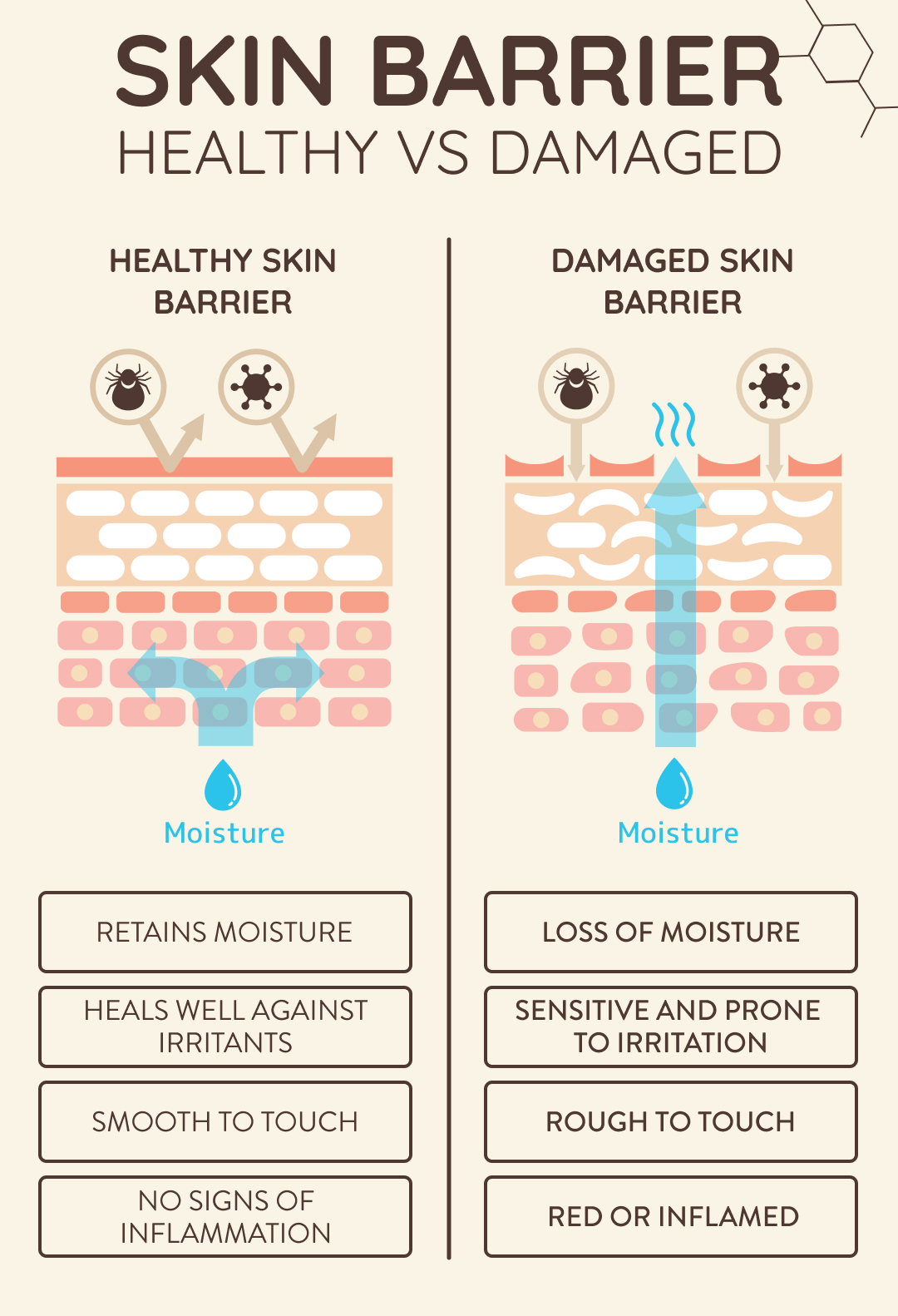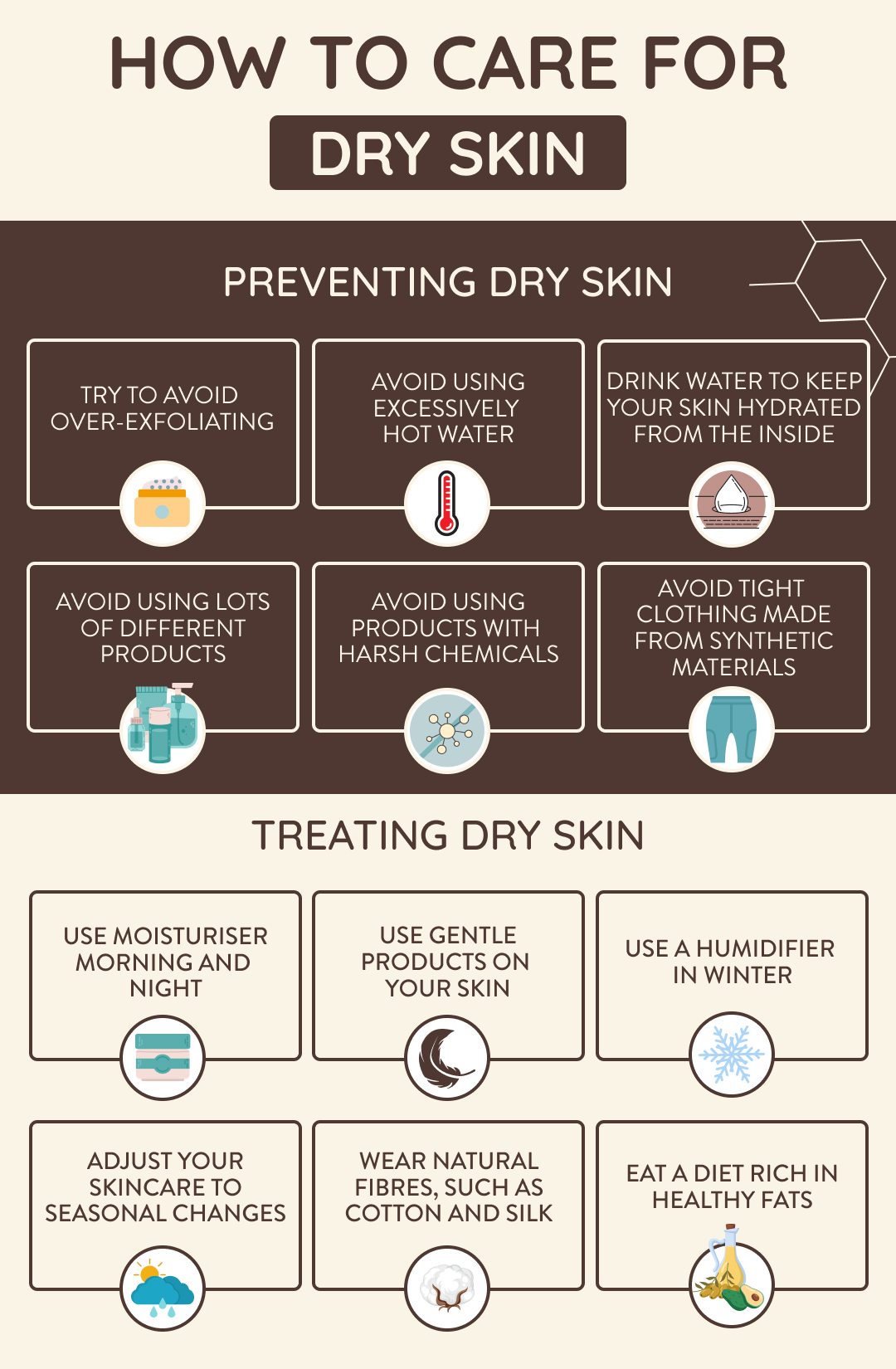Given that all of us have unique skin along with living in different environments and using a range of products, our skin can be a mystery and many of us often turn online to find answers to our skincare queries. But we may not always find the answers we’re looking for. Sometimes we may also be presented with false or unreliable information.
We found the top skincare-related searches in the UK across Google and TikTok for the past 12 months to see which questions and concerns were most in demand with people wanting help and information. And as a respected wellness pioneer, we wanted to provide expert insights and guidance to people scouring the internet for trusted help with their skin concerns.
Our research revealed a few distinct areas people were turning to the internet for answers. We’ve grouped some of the top search queries into the most common skincare categories below.
Dry and Sensitive Skin Queries
If your skin doesn’t have enough moisture, it can become dry. Dry skin is common and can be caused by a range of factors, such as the weather, age and health conditons. For example, cold climates with heavy winds can cause your skin to dry out. Therefore, if your skin appears drier than usual during winter, the temperature, and weather changes could be to blame.
As you age, your skin’s moisture-producing oil glands also start to dry, which causes the elasticity in your skin to dry up. Sometimes certain health conditions can cause dry skin such as allergies and eczema. If needed, your doctor should be able to determine if this is the case.

The best way to support most types of dry skin involves adding moisture. Moisturising your skin can help smooth and soften areas of dryness and help prevent cracking. It can also help to rebuild your natural skin barrier by adding moisture back to your skin.
There are various types of moisturising agents available, from ointments and creams to lotions and oils. Many of which contain special ingredients to help soothe and hydrate your skin. For example AVEENO® SKIN RELIEF MOISTURISING HAND CREAM is formulated with soothing oat and shea butter to help add the moisture needed and leave hands feeling nourished.
Make sure to choose the right moisturiser for your skin. For example, if you have sensitive skin, look for products that are hypoallergenic and fragrance-free. It’s also important to choose a product that is designed for a specific area of your skin. For example, if you are experiencing dry skin on both your hands and your face, then you may need a different moisturiser for each area.
For very dry, cracked and itchy skin, your GP may recommend a topical steroid, which can help reduce inflammation.
Sensitive skin is often characterised by stinging, burning or itchiness. You may not know you have sensitive skin until you have a reaction to a certain product. If you have sensitive skin, you may be able to support your skin by making a few simple adjustments to your skincare routine. For example, you could try switching to skincare products that are suitable for sensitive skin.
Several factors can cause your skin to appear sensitive suddenly, such as dry skin or health conditions that impact the skin. For example, if your skin loses too much water and oil, it can dry out. This can cause your skin to:
Feel rough
Appear red
Itch
Scale
Flake
Crack and bleed.
Some health conditions such as eczema can make you particularly sensitive to products that don’t bother most people. Whilst eczema can look different for everyone, it may cause:
Dryness
Itchy rash Cracked or scaly skin
Red or brown/grey patches of skin
Swollen skin.
To help manage dry skin, apply a moisturising cream to the affected area two to three times a day. This can help to restore moisture to your skin and prevent it from drying. Look for products that are fragrance-free as these tend to be more suitable for sensitive skin.
If you have skin prone to eczema, opt for products that won’t irritate your skin. You can try moisturising products that contain ceramides. Otherwise known as lipids, ceramides can help to form a protective layer over your skin. Your pharmacist or doctor can recommend creams to help manage eczema symptoms.
Other reasons why your skin may become sensitive suddenly include irritant contact dermatitis and allergic contact dermatitis. Irritant contact dermatitis typically happens when your skin becomes irritated by something it touches. While allergic contact dermatitis happens when your skin reacts to a specific substance. This could be a new shampoo or makeup product.
Contact dermatitis usually clears up on its own within a few weeks. If your skin is sore and inflamed, your GP may prescribe a topical corticosteroid to help reduce any inflammation. In severe cases of contact dermatitis, your GP may prescribe corticosteroid tablets.

Your skin barrier regulates water loss, retains moisture and helps keep you hydrated. But your skin barrier can become compromised by external factors such as the environment, pollutants and exposure to harsh chemicals. Signs of a compromised skin barrier may include dry skin and sensitive skin.
There are several things you can do to help protect and restore your skin barrier. A good place to start is by reviewing your current skincare routine. For example, certain types of scrubs and brushes you’re using could be damaging your skin barrier. Additionally, if your skincare routine is too stringent, this could be weakening your skin barrier.
You can also incorporate products into your skincare routine that can support the skin moisture barrier. For example, AVEENO® SKIN RELIEF MOISTURISING LOTION, expertly formulated with triple oat complex and shea butter, strengthens the skin’s natural barrier to help protect against external aggressors.
You may also want to avoid over-washing your face and steer clear of products that contain harsh chemicals. Sometimes, humid and dry environments can damage your skin barrier, so it may be best to avoid these if your skin is particularly sensitive. Being mindful of pH and choosing products with a pH between 4.0 and 5.0 may also help protect and restore your skin barrier.
Real Skin Experiences
Sensitive skin can appear in various forms and come out of nowhere. We spoke to two people in the UK to learn more about their experiences with sensitive/irritable skin issues and what helps them manage it.
Alex, 29, Male, Leeds
I never used to experience sensitivity until these last couple of years and now it's become a daily occurrence on my face, eyebrows, and beard, almost like an overnight skin reaction completely out of the blue. Maybe it's an ageing thing – I’ve no idea! It shows up as blotchy redness and occasional dryness/flakiness (urgh). The things I’ve found that make it worse are fragranced skincare, drinking alcohol, rough exfoliation, dry air (internal with no circulation), and stress. I manage it with a morning moisturiser which is very nice. I keep it in the fridge as the coolness seems to help. I've also actually swapped to Aveeno's Calm and Restore Cleanser which doesn't aggravate my skin. I keep it in the shower now and use without thinking. Swapped from a much fancier cleanser which I used before but that wasn’t very good for my skin.
Cold, dry air seems to be the worst for affecting my skin and seems to trigger a reaction. Staying inside more in the colder months with the central heating has a bad impact on my skin.
I'd like to know what skincare ingredients to avoid at all costs, as well as which can be layered in a routine that would help, including which can't and in what order.
It's a constant journey and conversation. There is no 'perfect skin' that once achieved you've 'won'. Some days will be bad and that's fine, don't let it impact you too much. It's likely far more important to you than the people you will see that day. And it will improve. And have PATIENCE with a new product, they take time to work.
Taylah, 23, Female, Essex
I have eczema and have done since I was a baby, however at around age 10 it went, and then around 4 years ago when I was 19 it came back worse than when I’ve had it previously. My affected areas are on my body, particularly on the backs of my knees and the back of my elbow (where your joints naturally fold when bending and straightening). There are many factors that can aggravate it, for example - stress, poor quality clothes, having too much dairy, being sweaty after the gym, temperatures (being too hot and too cold), hot showers – this dries out the natural oils in my body resulting in a flare up. Things that can help it are taking colder showers, watching my dairy intake, and moisturising frequently. It shows up as a rash, so I make sure I am constantly keeping affected areas hydrated and moisturised and also let the areas breathe so no tight clothes.
The cold weather definitely dries out my skin causing the eczema to crack, however, I have found whenever I am in a hot country the sun helps my skin and ultimately clears it for a few weeks. Similarly, with a sauna or steam room, the hot air helps relieve it.
I have seen multiple GPs, I have tried so many products (some prescribed), and some bought from various shops. I have had steroid cream prescribed which sometimes works, although what I have found most effective is cutting out dairy. I am using the Aveeno Dermexa Daily Emollient Cream currently which is designed for people with extremely dry skin, and it has been working great to keep my skin moisturised.
I would love to ask an expert:
What are the best products to use on eczema-prone skin, as so many products have extra additives therefore irritating the skin further?
What are the risks of using steroid cream regularly on the skin if it’s the only thing that helps clear it?
Is there a specific routine to follow if you have sensitive skin, i.e. moisturiser as soon as you’re out of the shower or bath?
I would advise someone to think about their diet and what they consume, whether it’s eating a lot of sugar/dairy/saturated fats, as making a small dietary change might positively affect your skin.
Oily Skin Queries
Oily skin received 2,211,310 searches across TikTok and Google in 2024.
Oily skin is caused by too much sebum. There are a variety of factors that can increase sebum production including stress, genetics and hormones. If your oily skin is caused by hormones or genetics, then it may be tricky to prevent. However, avoiding unhealthy foods may help.
You may also be able to manage oily skin with our skincare routine for oily skin below, or could also try some simple skin remedies. For example, if your face is oily, aim to wash your face twice per day. You can also try some home remedies such as applying honey to your skin. Honey is believed to keep your skin moist, but not oily.
Looking for a simple oily skincare routine? Try our three-step regime below:
Cleanse your skin in the morning and the evening (opt for products with salicylic acid)
Follow with an exfoliating toner (look for products with salicylic acid, glycolic acid and lactic acid)
Finish with a moisturiser (look for products that are water-based, lightweight and don’t contain any oils).
Skincare Queries
Skincare as a topic received 249,800 searches across Google and 3,721,000 searches across TikTok in 2024.
A toner is a type of skincare product that helps to remove dirt, oil and makeup from your face that you may have missed during cleansing. Typically, a toner is applied to the skin after cleansing and followed with a moisturiser.
Not sure which order to do your skincare? Follow our basic morning skincare regime below:
Cleanse your skin.
Apply a toner.
Apply a serum.
Apply eye cream (if using)
Moisturise your skin with a suitable moisturiser.
Apply SPF to protect your skin from the sun.
You can repeat these steps in the evening, but there’s no need to apply SPF. You’ll also want to remove any makeup you’ve worn throughout the day before cleansing your skin.
Top Tip: opt for products that are tailored towards your skin type. For example, if you have sensitive skin, look for products that are gentle and fragrance-free.
Hyperpigmentation is a term to describe skin that appears darker than other areas. It can affect patches of the skin or the entire body. Whilst hyperpigmentation won’t go away completely, there are several things you can do that may help reduce the appearance of dark spots. For example, chemical exfoliation helps get rid of old skin cells and promotes new cells to emerge. This can help even and smooth out your skin tone.
Skincare Routine Queries
Skincare routine received 1,619,870 searches across TikTok and Google in 2024.
There is no one-size-fits-all skincare routine. The best skincare routine starts with knowing what skin type you have. Knowing this can help you understand how to take care of your skin. For example, if you have dry skin, you may want to opt for a gentle cleanser, free from alcohol and fragrances. These ingredients can dry out your skin even more. For oily skin types, an oil-free cleanser may be a better option as these products can help remove extra oil from your skin.
Moisturising should be a key part of an eczema skincare routine. Moisturise straight after showering or cleansing to help lock in moisture and soothe your skin. It’s also important to avoid bathing /cleansing with hot water as this can dry out your skin. Opt for lukewarm water instead.
Building an effective eczema skincare routine also involves choosing skincare products wisely. For example, it’s best to steer clear of any harsh products and ingredients that could trigger your skin.
During pregnancy, you’ll need to make sure the skincare products you’re using are safe. Most cosmetic products are fine to use, but always check with your midwife/doctor to determine if the products you are using are safe for pregnancy, especially any medicines or supplements you may have bought.
Some products worth avoiding include:
Tanning sprays
Tanning pills
You can also follow a simple pregnancy-safe skincare routine:
Cleanse your face with lukewarm water and a mild cleanser
Apply a serum (this step is optional)
Moisturise your skin (choose a product that is suitable for your skin type)
Appy an eye cream (again this step is optional)
Apply an SPF to protect your skin from the sun (complete this step on a morning before heading outside).
Fine Lines Queries
Fine lines received 325,590 searches across TikTok and Google in 2024.
Fine lines are the start of wrinkles that appear on your skin. They often look like small creases on your skin, and you may notice them on your face when you make certain facial movements. When you age, fine lines form wrinkles. These tend to appear as deeper creases.
Wrinkles and fine lines are a natural part of ageing, and you can’t prevent them. But there are several skincare tips you can try to reduce your risk of developing them early. This includes wearing suncream every day, moisturising your skin daily, keeping your face clean, and removing makeup before bed. Avoiding tanning beds may also help.
Glass Skin Queries
Glass skin as a topic received 1,820,760 searches across TikTok and Google in 2024.
Glass skin has become a popular beauty trend in recent years. The trend emerged from Korea and essentially means clear skin that appears almost see-through. To achieve glass skin, you can try layering different products onto your face. Following a dedicated glass skin care routine may also help you achieve a ‘glassy skin’ look. Read on to find out about the different products and routines to help with achieving glass skin.
The following products may help you achieve glass skin:
An oil or foam cleanser (to open and clear your pores)
An exfoliator (to remove dead skin cells and brighten your skin)
A toner
Serum or face oil
A moisturiser (to help lock in the products)
SPF (If your moisturiser doesn’t already contain one).
You can also try moisturising face masks to add extra hydration to your face.
This step-by-step routine may help you achieve glass skin:
Double cleanse (use a gentle product that won’t clog your pores)
Exfoliate (if you have sensitive skin, keep this to a maximum of twice per week)
Apply a gentle toner (avoid products that can dry out your skin)
Apply serum or face oil (You may want to opt for a plant-based oil that is light on your skin)
Moisturise (opt for a non-greasy formula)
Apply an SPF (look for products that are hydrating and don’t leave residue).
Key Takeaways
It’s clear to see that people in the UK have a lot of questions when it comes to skincare, and each share their own skin concerns. Whilst there is a lot of useful advice out there, there is no one size fits all approach. We all have different skin types, with different skincare needs. Therefore, knowing how to take care of our skin properly starts with understanding our skin type and building a healthy skincare routine accordingly.
